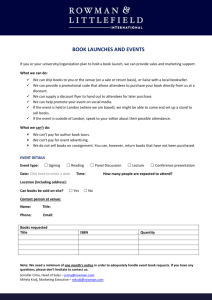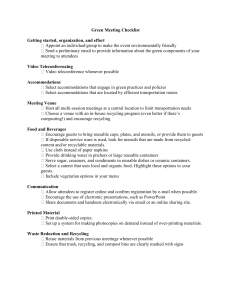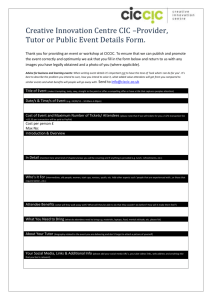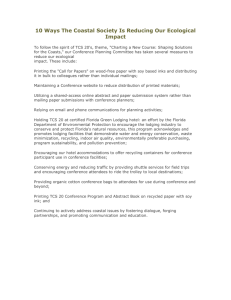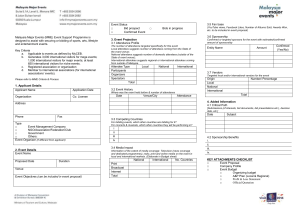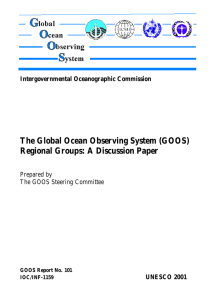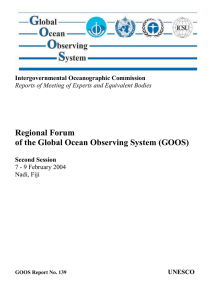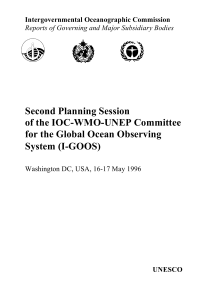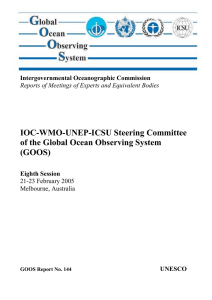TOP 10 TIPS FOR HOSTING A “GREEN” FOREST SERVICE MEETING
advertisement
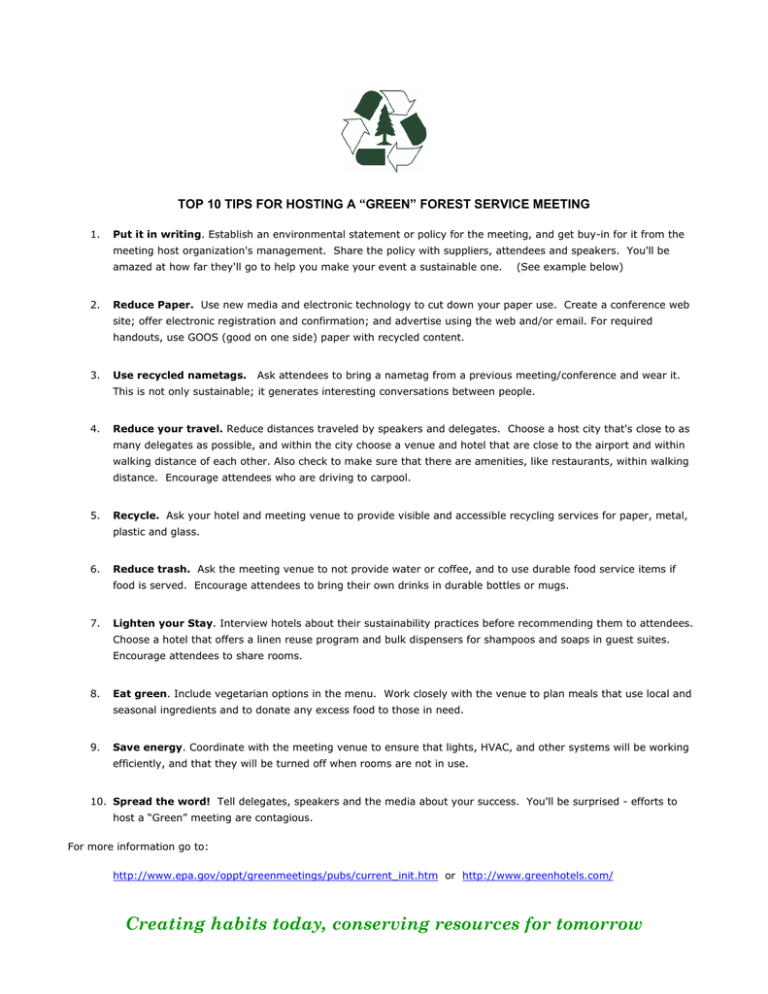
TOP 10 TIPS FOR HOSTING A “GREEN” FOREST SERVICE MEETING 1. Put it in writing. Establish an environmental statement or policy for the meeting, and get buy-in for it from the meeting host organization's management. Share the policy with suppliers, attendees and speakers. You'll be amazed at how far they'll go to help you make your event a sustainable one. 2. (See example below) Reduce Paper. Use new media and electronic technology to cut down your paper use. Create a conference web site; offer electronic registration and confirmation; and advertise using the web and/or email. For required handouts, use GOOS (good on one side) paper with recycled content. 3. Use recycled nametags. Ask attendees to bring a nametag from a previous meeting/conference and wear it. This is not only sustainable; it generates interesting conversations between people. 4. Reduce your travel. Reduce distances traveled by speakers and delegates. Choose a host city that's close to as many delegates as possible, and within the city choose a venue and hotel that are close to the airport and within walking distance of each other. Also check to make sure that there are amenities, like restaurants, within walking distance. Encourage attendees who are driving to carpool. 5. Recycle. Ask your hotel and meeting venue to provide visible and accessible recycling services for paper, metal, plastic and glass. 6. Reduce trash. Ask the meeting venue to not provide water or coffee, and to use durable food service items if food is served. Encourage attendees to bring their own drinks in durable bottles or mugs. 7. Lighten your Stay. Interview hotels about their sustainability practices before recommending them to attendees. Choose a hotel that offers a linen reuse program and bulk dispensers for shampoos and soaps in guest suites. Encourage attendees to share rooms. 8. Eat green. Include vegetarian options in the menu. Work closely with the venue to plan meals that use local and seasonal ingredients and to donate any excess food to those in need. 9. Save energy. Coordinate with the meeting venue to ensure that lights, HVAC, and other systems will be working efficiently, and that they will be turned off when rooms are not in use. 10. Spread the word! Tell delegates, speakers and the media about your success. You'll be surprised - efforts to host a “Green” meeting are contagious. For more information go to: http://www.epa.gov/oppt/greenmeetings/pubs/current_init.htm or http://www.greenhotels.com/ Creating habits today, conserving resources for tomorrow ENVIRONMENTAL FOOTPRINT STATEMENT FOR THE 2006 SUSTAINABLE OPERATIONS SUMMIT The US Forest Service is committed to minimizing the environmental impact of the 2006 Sustainable Operations Summit through: • Decreasing the amount of solid waste produced by the event; we will accomplish this by: 1. Limit the number of handouts that are provided. For those handouts that are provided, print them on GOOS (Good on one side) paper. 2. Asking participants to bring a previously used nametag. For participants that don’t bring a nametag re-usable name tags (from the 2005 Summit) will be used and collected the end of the Summit so that they can be used again next year. 3. Assuring that all of the paper products used have a minimum 30% recycled content. Copies not made on GOOS paper were made on 100% recycled content paper. 4. Providing GOOS paper for note taking, eliminating the need for notebooks. 5. Assuring that the food service items used at the meeting site are durable and reuseable. 6. Providing separate recycling bins at the meeting rooms for collection of unused booklets, name tags, pens, bottles, cans, newspapers, etc. This shall be arranged with the recycling program at the University. 7. Limit the number of flipcharts that are used – try to record as much as possible on laptops. This also supports the ease of transferring notes to the web • Reducing energy and water consumption at the event; we will accomplish this by: 1. Carpooling from our offices/homes to the conference. Send out a list of attendees and their office locations prior to the event to encourage carpooling of FS or rental vehicles. 2. Encouraging public transportation/walking/carpooling from the hotel to the meetings. Bus service is provided from hotels to campus and also to downtown activities. 3. Interviewing hotels on sustainability policies prior to recommending them to attendees. 4. Ask the University to not provide pitchers of water on tables. Participants will use individual bottles that they bring themselves. • Disposing of solid and liquid waste in an environmentally responsible manner; we will accomplish this by: 1. Recycling paper and containers in bins available at the meeting room 2. Discuss recycling of all food service waste at the luncheon with University 3. Discuss local recycling policies with County/City and tell attendees what’s happening locally 4. Check University policy on donating excess luncheon food to charitable organizations. Contact local charities. 5. Discussing further recycling strategies with University of Wyoming hosts. • Educate attendees about consumption choices: we will accomplish this by: 1. Hosting a luncheon using local food with an educational portion sponsored by the University of Wyoming. 2. Encourage hotel room sharing. 3. Participate in an ecosystem cap and trade game that fosters discussion about local consumption choices. Creating habits today, conserving resources for tomorrow
